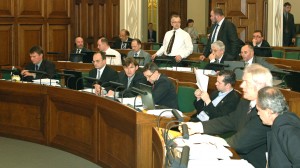
Opposition from ethnic Russian groups and the national broadcasting association didn't stop the bill from passing the Saeima a second time. Photo by the Saeima Chancellery.
RIGA — The Latvian parliament on Monday passed a revamped version of the broadcast media language restriction bill that President Valdis Zatlers vetoed, passing the version with his intended changes.
The controversial bill, which requires television and radio broadcasters to have 65 percent of air time, including at least 40 percent during primetime hours between 6 p.m. and 11 p.m. be conducted in the Latvian language forcing the country’s Russian-language media to change formats. While the bill’s stated purpose was to further integration between the country’s two largest ethnic groups, it had the opposite effect on ethnic Russian groups. The bill is part of a long-term government goal of having all residents be fluent in Latvian by 2030. As the president insisted, the law now applies to regional as well as national broadcasters.
Although Zatlers contends that the bill is constitutional, the Russian foreign ministry criticized the bill last month, saying it violated the human rights of Latvia’s large ethnic Russian minority. Russian foreign ministry spokesman Andrei Nesterenko said the bill was in fact unconstitutional as it was similar to language quota laws struck down by the Constitutional Court.
“Such action by Latvian authorities reaffirms how justified the Russian side had been in repeatedly expressing concern about the Latvian law, which restricts the internationally recognized rights of national minorities, including in relation to the use of language,” the Russian foreign ministry said.
Meanwhile National Council for Radio and Television head Abram Kletskin called the law “meaningless” in an interview with the Russian language newspaper Telegraf on Monday, as newer televisions allow viewers to choose languages, effectively rendering moot the law’s goal of broadcasting in Latvian only.
“When you broadcast the World Cup for the LTV could choose the language. New technologies give viewers more freedom. And once they become everyday reality, restrictive rules of this kind would lose its meaning,” Kletskin said. The council issues licenses for broadcasters.
Latvian Association of Broadcasting director Gunta Līdaka said the law will cause regional broadcasters in areas with concentrations of ethnic Russians like Latgale and Riga to lose viewers. The association includes all Latvian television stations.
“The regional TV stations that broadcast in Latvia, where there many Russian speakers will suffer,” Līdaka told Telegraf. “It turns out that minorities will not have any free channel in their language. And this is giving discriminating treatment.”
The law also restricts the amount of airtime that can be used for advertising instead of original programming.
This article is free to view. To read Baltic Reports’ subscription-only articles, click here.












